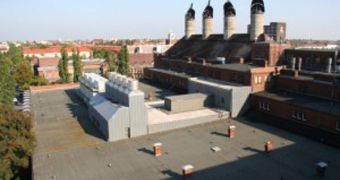Berlin entrepreneurs want to minimize the ecological footprint of our eating habits. Instead of relying on expensive food imported from different countries, traveling by plane or other large vehicles before it ends up in refrigerators, ingenious developers try to implement changes by welcoming an urban rooftop farm in the heart of the city.
They want to prove that productive sustainable farming technique are not only the symbol of rural regions, since they can be successfully applied also in urban populous areas, providing an impressive list of benefits for the residents' health, Spiegel reports.
The Frisch vom Dach, also known as ‘Fresh from the Roof’ project, aims to create and maintain an amazing garden and a fish farm occupying approximately 7,000 square meters on a giant roof. Nowadays, when the global food demand goes through the roof, it is definitely the right time to start planting some seeds.
Officials behind this ambitious project say people from Berlin desperately need a local source of nutritious food and the large roof of the former malt factory in Berlin's Schöneberg seems like the perfect location to harvest herbs, tomatoes and lettuce, while taking care of a few fish that will certainly end up on plates without suffering from any form of pollution.
The plan sounds good on paper and developers have high expectations. They intend to grow and sell tons of fresh products every month. Local food is known for its health benefits, but also for its impact on the environment.
They aim to improve the air quality, since food wouldn't have to be imported from remote destinations and transported by large vehicles polluting the atmosphere through harmful GHGs.
Moreover, the team is no stranger to water preservation. They have come up with an interesting option. The excrements obtained from fish will be transformed into nitrates, as fertilizers for locally-grown veggies.
Plants play an important part since they purify the water populated by fish. The economically sustainable system is entitled “aquaponics.”
The project doesn't stop surprising us. Apparently, 200 liters of water are required for every kilogram of fish produced, only a fifth of what traditional fish farms use to obtain similar results.
Green initiatives developed on such a large scale are often carrying a considerable price tag and this project makes no exception. It seems that the entire facility has to be backed by an estimated €5 million ($6.7 million) and the group is currently looking for eco-friendly investors with large pockets.

 14 DAY TRIAL //
14 DAY TRIAL //